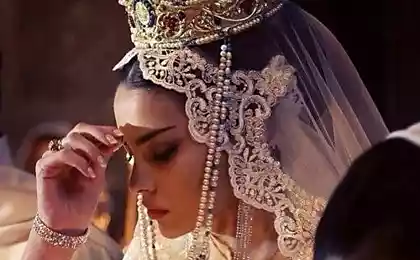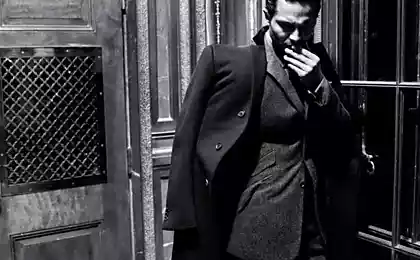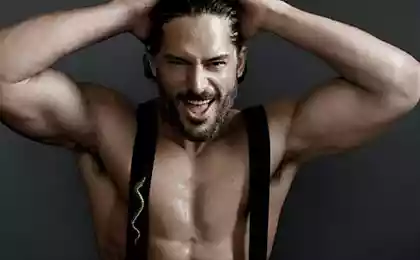891
Andrey Lorgus: the Woman cannot make a man a man
In our culture there is a shear deformation of the male line of all generations. It is no exaggeration to say that almost every Russian family feels in one or more generations, the shortage of male presence. And it can not affect the personality development of men and against men.
Recently released "the Book on fatherhood" Archpriest Andrei Lorgus, is devoted to speaking about men, about men's calling to be a father, about the difficulties and joys of fatherhood, father's love and the love of the father. Talked with the author about the main ideas of the book.
Eighty two million eight hundred nineteen thousand five hundred nine
Father Andrew, speaking of the parent-child relationship, modern society focuses on the role of the mother and almost does not speak about the role of the father. Moreover, a search in Yandex for the word "paternity" in the vast majority of links offers to do a DNA test to establish biological paternity, i.e. a father's role in the public consciousness now is limited almost exclusively to conceiving a child. How was such a situation, what are the reasons?
If the answer to this question from a cultural point of view, it is an old story, rooted in the second half of the nineteenth century and continuing throughout the twentieth century. Summarizing, we can say that the culture of European countries to which Russia still belongs to — this is largely a culture of rebellion against his father, fighting with his father, and his father, overcoming the tyranny of his father and the murder of the father.
About this and the novel of Dostoevsky "the Brothers Karamazov", and the novel Turgenev's "Fathers and sons", and many Western novels in which the hero wins his father, refuses father. This is a revolution, a regicide, it is the overthrow of idols. The entire Soviet cinema, especially the Soviet built on the humiliation of fatherhood.
Socialism as such, and Bolshevism in particular — a culture of rebellion against the father or patricide (remember Pavlik Morozov, and other similar examples). It's cultural, historiosophical aspect. From the psychological point of view the situation is clear: Patriarchy is built on fatherhood and the disintegration of Patriarchy has led to the fact that it changed the structure of families, and the main structural family burden, in the absence of the father, was on the shoulders of women.
After all, as developed in the twentieth century from a psychological point of view? In the twentieth century, prevailed to set out, to give the woman the opportunity to develop freely, to release her from destroying the identity of the material life, to make it independent, so it could be implemented as a person, as a professional. And for this it was necessary to release it from those Patriarchal structural relationships associated with a man. About the end of 50 years in all post-Christian world managed to do it, and it turned out that the woman lost her family.
Lost — not so refused. Lost — so that the family became a problem for her (it's hard to get married, it is difficult to give birth and make a career, a man does not want families, etc.) It immediately became apparent, but gradually came to realize that the woman lost her family and is confident that it can be achieved through marriage and motherhood. Following this, in psychology, in philosophy, in religion there is a reverse movement — salvation of motherhood.
The slogan of the salvation of motherhood — this is the slogan of a passenger of a sinking ship screaming "save me! But don't save the ship, do not let the power captain". But it is clear that to rescue passengers impossible, if not to save the ship and save the ship impossible, if not to save the captain. But since the captain is the authority, the order, the passenger is limited and requires to save only him, and the ship may sink.
As a result, the ship really is sinking, and passengers can't escape. Because the boat will not float away. Here is a metaphorical description of what happened to the family. That is, the decomposition of the Patriarchal culture led to the disintegration of the family and to the fact that the woman instinctively grabbed the family, and because it structurally can't hold her, she was depressed, was a slave to his desire to have a family in whatever it was.
If a man have a family doesn't want and wants to have only a mistress, and a woman agree to be a mistress just to obtain family and child, she gets kidnapped by this their vocation. And now in our society (Western society this is not) a woman takes upon himself all the burdens of the family and, above all, responsibility — because to share this responsibility she has no one.
Seventy eight million seven hundred seventy one thousand two hundred four
To entrust the responsibility to the man she is afraid of because it means, as she seems to return under the yoke — so that psychologically she was trapped. The trap is that on one side it is threatened by the power of men, and on the other, over responsibility for the family.
And then there is a choice of either family or alone. And a woman can be successful in your profession, in your career, financially, she could be married and have children, but her happiness it brings, because the family — husband and children — she uses as part of the social basket.
Even if she's alone, she can realize her own motherhood, and socialism any spill — Soviet, Swedish, French, American — it can, to help as a single woman with a child gets large enough privileges and can survive. That is, it easily can live without a man, a man she doesn't need.
Not economically necessary, and psychologically?
And psychologically do not need. She is afraid of him because he resembles her father. Father, who drank, shouted, and beat.
Interesting to compare Your thinking about parenting Chapter from the book of Genesis, which refers to the sin of Ham. When you read this Chapter, it is not clear why the sin of ham is so heavy that it is followed by the curse of his father Noah. In the context of the ideas of the importance of fatherhood — and not only for families but also for the existence of culture and statehood is a curse becomes more understandable.
Yes, the biblical story help to reveal this issue, although it is not all clear. Indeed, in the text of the Bible does not say literally that ham laughed at his father and humiliated him. But apparently, the way he did it was for the brothers and father are obvious disrespect to the father.
But the text does not give an accurate description of Hama guilt. But best of all this theme helps to uncover the whole history of the cultures, first of all, culture is Judeo-Christian: it's all built on the idea of fatherhood, of monarchy, of order. It is usually said that in the matriarchal times was much better.
Indeed, the matriarchy has some properties, which should be applauded, such as the absence of war. Mothers tend to agree, since their task is the protection of life. And a matriarchy would never go to a confrontation, to war, to the loss of such a huge number of men.
But history, unlike stories, do not know the matriarchy, and there are only guesses that had some separate periods of matriarchy, but they are so insignificant to the entire history of humanity, what to say about them as a real alternative is not necessary. Culture and statehood is a product of a Patriarchal society.
Sixty million one hundred ninety thousand six hundred nineteen
Those forms of government that exist now are far from the Patriarchy, they're something fundamentally different, from an anthropological point of view, is not fully understood. They dominated, of course, feminine traits: accommodating, courtesy, flexibility, diligence, obedience; for example, in modern Europe prefer not to fight, and to agree not to press and patiently to wait, to build some long term without any loss without loss, without violence, without wars.
It's still a typically female approach. Not to say that it is bad; from a Christian point of view, it is just good because it puts human life on a high pedestal.
Obviously, judging from the trends that a traditional Patriarchal society, we will not return. Then what can be the constructive variant of development of relations in the family?
I believe that other options besides Patriarchal, unsustainable. Let me rephrase, the disintegration of the family, while maintaining a modern geocentrists way of life will continue. And if we, as a society, can't return to the Patriarchal way of life, it can make individual family and community.
In my psychotherapeutic practice I often observe that women who take the power of men over themselves, quite happy. Of course, they use the opportunity of his career, his professional development. And it's not just fantasies and dreams. To some extent the culture of the middle class, where it is, and, above all, the subculture of the Christian community, embodies these ideals.
On the one hand, this social layer is distinguished by a strong family, there are not recognized as abortions and divorces. So people there really kept for the family, while women have a great opportunity to make a career and to satisfy their need for professional development.
Yes, they have to sacrifice and the first 20-25 years of marriage to devote to the children, but then when the children grew up, and the woman is 45-50 years old, she begins to engage in a career. Yes, it is difficult and risky, the woman is afraid to drop out of the profession, to lose the qualification. And many of them do not return to work, remain as Housewives.
So the possibilities of combination of Patriarchy and women's career exists. Intuitively these individual families and communities families feel that the Patriarchal family structure — the only living. It corresponds to human nature.
However, many modern women, brought up in absolutely other conditions, such an idea is abhorrent... How can they be?
The woman will not be able to solve the problem with her husband and father to his children as long as it does not solve the problem with his father. And from a psychological and spiritual standpoint can be only this: the woman needs to come to terms with his father and to receive his blessing, his protection to join in family life.
That is the task of the father (or eldest male in the family) is to give his daughter in marriage, charging her and bless the man she marries. It is very important for a woman: if she does, then she will be a huge concern. A woman doubts whether she is not wrong in his choice, and will man it for what it is. The fact is that when a man sees a lone woman, he realizes that he has a definite advantage and power over her, and he can do with it what you want.
Sixty five million four hundred ninety six thousand three hundred ninety nine
And the woman it feels great, so she's very afraid of the man. In principle, afraid: afraid to trust, afraid to enter into a relationship, afraid to love. But when the woman is the father or the eldest male, then it is much easier to establish a relationship, because she understands that it will always support and protect.
Then the woman can devote themselves to relations with the man she chooses. But on the other hand, a man, who sees behind her a male figure, understands that it can't do that lightly, that is a serious matter. Either he goes or marries. This is the first.
Second, what matters for this decision is to respect and accept his choice as your husband, and not as an object to satisfy their ambitions, desires and complaints. That is until, until the woman learns to respect a man in principle, it will not be able to build relationships in marriage and have strong family.
And what is respect for the man?
This respect for the identity of another person as the image and likeness of God. Genuine respect is based on this because if we only — social roles, of which the sustainable respect can we talk? But if each person is the image and likeness of God, a spark of God, then had the respect for him is unconditional, no matter what it is — healthy or sick or disabled, an alcoholic.
Then the respect has a profound basis: this man is my husband, the father of my children. And if the family creates a woman, it is her initiative, as is currently often the case, nothing good should not wait. "The woman created a family" sounds like "the woman bought a one-bedroom apartment," "the woman has entered into a mortgage, the woman found a job" — it's all consumer, user jargon. Family creates not one but a couple, loving each other.
It happens that a man does not want children. What are the reasons for this reluctance?
You see, if a couple agrees, and they have sexual relations, they are responsible for children that are possible in this case. The desire to have children and take responsibility for them — question by which to test a relationship. I often see this in parish business.
I ask the question to the man: "you Have a woman, you want her you gave birth to your children?"He replied: "Yes, I do." Then I said, "Very well, marry." Asking the same thing from women: "You want to give birth to his children, his flesh and blood?""Yes, I do." "Very well, marry". Some women say, "Yes, I like being with him, but the children I did not want."
Sometimes women talk, it is clear that the man they even physically unpleasant. Then the question arises: what relationship, if she doesn't want kids with him? From the beloved? Similarly, if the man is in a relationship with a woman and doesn't want children, the question arises: why else would he have married? If a couple wants to have children, what's that relationship? Is it possible and do they need help? This pastoral, and therapeutic survey.
There is a view that women are driven by maternal instinct, and so they used to start a conversation about children. On the other hand, there is a view that the commitment to parenthood is the result of a serious personal development.
There is no maternal instinct. Imagine a simple thing: if there was a maternal instinct, isn't been done millions of abortions? What kind of instinct it is, if you make 10-15 abortion does not cause women internal protest? Willingness for parenthood is a family-tribal, psychological and then social setting, perceived and internalized. It's easy to show that women, who grew up in orphanages and boarding schools, generally do not understand what motherhood is and what to do with it.
Psychologists still distinguish between maternal and paternal attachment, saying that paternal attachment is different. There are even claims that up to a certain age the father of the child is not particularly necessary, because to take care of a baby is a function of the mother, and the father becomes important for a child of four years when his active acquaintance with the social environment, and the father helps to understand where good and evil is a mirror of the actions of the child, his guide into the world. Is it really so?
This is a mistake. If we are talking about marriage, not about marriage, that the unborn child has developed successfully in the first place, it is necessary that dad and mom loved each other. This creates the same environment in the body, in the uterus of a woman can be called a Paradise world and which will thrive child.
It is very important that this conception was desired — and this requires love and maturity. If the woman grows in her womb a child, and around it there is love that creates man, it is tense, anxious, it depressed child feel bad. If a woman loves a man, and the man loves her, she is relaxed, she is good, and the baby is developing fine in such an environment.
He lives in grace, and when he is born, he is born in love. Like his parents, and he feels in this world. Then, when the child is small, it is, of course, is entirely in the hands of women, but he goes through the mother that the love of a man, his father, aimed at his mother. This is important: the father's love at an early stage of development of the child directed to the mother, not the child.
And then the woman well, she may completely surrender the child and give him affection, tenderness, care and attention. And then the little child perceives the father through the prism of maternal love and gratitude. The role of the father is not bound to any deadlines. First, it is transmitted indirectly through the mother, and it has to do with how the mother responds to the demands of her husband and the father of her child.
It demands order, care, moral requirements, religious requirements. The child is growing, he sees it through a mother who respects the father, and which takes with the love of his demands and proposed rules. And then the child comes into the sphere of influence of the father and learns from him. The father is demanding, the mother and the child becomes accustomed to the fact that he can be responsible for ourselves before the father and then to himself. And this chain of parent-child relationships is built on.
Now, many children grow up in single-parent families. Can a mother fully educate a child alone, compensating for the absence of a father or connecting to his upbringing alternate father figure?
Of course, in the family there are deputies: a grandfather, uncle, brother, already outside the family are school teachers, sports coaches, spiritual mentors, in the end. But it will not give any results if the relationship with father is not established because of your mother.
Because everyone has the right to know their parents and child at any age is very important to know the father, to feel his warmth, his love, his existence in the world, to feel that he lives in thanks to the father. Any replacement pieces will be a good addition to this fundamental feeling and attitude. Even if the mother does not live with his father, they fail to keep the family together, it is very important to allow the child to communicate with his father somehow.
Sixty two million three hundred ninety five thousand two hundred seventy one
And if the father died at an early age?
Then very important is the attitude of the mother to the father. How she treats her husband with respect, love? If she pretends it never happened, the baby it can lead to schizophrenia or drug addiction.
How to treat a father with respect, if he was, for example, an alcoholic or a criminal?
There is no other way, only respect for his father. Another father will not. No matter how bitter and difficult, but that's my dad: yeah, he's a drunk, he rushed at mother with a knife, he was cheating, but he's my father. No other way.
How do you, as a priest and a psychologist, approach the popular idea of the participation of the husband in childbirth?
Intuitively I'm against. I think this idea has arisen, on the one hand, motivated by some jealousy of women to men that they do not experience the agony of labor — women want to make men partakers of his sufferings, that they were more valued and respected.
If you can live with me the hurt, you are not going to appreciate me and to respect. On the other hand, from my point of view, the woman thus wants to tie the man to the child (a kind of imprinting, which opened in zoopsychology). That is absolutely wrong, because it for male labor sometimes means simply the shock, psychological trauma, after which some men then are afraid to touch his wife.
Not always, but it happens that in men there is a physical aversion to intimacy. By men, I'd say it's a way of rehabilitation before the Martyr-wife, a kind of flirting. Some men go for it in order to feel paternal feelings, believing that his paternal feelings in men just as in women.
But this is wrong because women they arise from the moment of conception, and male to experience them, as she still can't. And it is useless to complain, because men have paternal feelings are formed differently. But many men do want it for different reasons.
I think that most likely these men is affected by maternal neurotic complex, strong attachment to the mother: the presence during childbirth is some attempt to repay his mother's attention and care towards his wife. It is my hypothesis.
So I think that the idea of partnership delivery is fundamentally about, although not prohibited. There is something spiritually flawed, in my opinion, if to consider this question from the point of view of the old Testament. In the old Testament tradition, the birth was something intimate for a woman, something man is not allowed.
As a father it is better to show your love for the child? What he could do to have formed a trusting relationship?
Anything. Can take with you to work, to the garage, to hike, to travel, to walk, to talk. The child is very interesting parent at all, because for a child adults is a source of discoveries. Therefore, there is an infinite number of possibilities. Of course, hard for baby to take to the office, where it will seem boring and incomprehensible. But if the father works not only on the computer, then you can take the baby with you and to accustom him to any work. And child is interesting.
Eighty nine million one hundred ninety five thousand four hundred ninety eight
Sometimes dad works a lot, trying to earn money for the family and not spend a lot of time with the child. A full weekend is enough to the child to the father's fellowship was completed?
It is impossible to say. Of course, the more, the more the father includes the child in your life, the better. However, his daily presence near the child to maintain a good relationship still optional. The child knows that he has a mother and father is a celebration. It perfectly adapts to this, even no need to explain. Of course, she is, of course, is waiting for, but understand.
And what is the role of the woman in relation to her husband if she could help him become a father, in addition to respect?
You know, a woman cannot make a man a man.
But the couple each other because mutually support?
Support but do not teach. How did the woman know how to be a man?
Let's say we get up in the morning and preparing Breakfast, facilitating care with other members of his family…
No relieve, this is a false idea. After all, what is better? We take the responsibility. When we take away someone's responsibility, the other transfers it to us and thinks: "Aha, now I do not have it now does, and I can do other things".
But the family after all, constantly changing roles, and care about each other?
Of course, but what You say, this is not relief, is the fulfillment of the functions of another in the case of a deficit. Yes, if a woman was in the hospital, a man and children take what they can — in the case of an emergency shortage, but normally this is not necessary. The idea of alleviating the worries generally insidious because it removes the responsibility for his life. But the man forgot to take it. Love is not subservient.
Is the role of the grandfather from the father's role?
The role of the grandfather, above all, to be the father of the father to show his son his future path. Secondly, its role is to keep the family tradition and pass it along the chain from father to son — is the role of family Patriarch. In addition, his mission in the unconditional male love, in which the reduced degree of anxiety and responsibility for the child's life, for his health, for education, for progress.
Twenty nine million six hundred twenty thousand four hundred forty five
Gradual conditional father's love in unconditional transformered?
A father's love is always unconditional, but it can be more demanding, and the grandfather's love is more encouraging, accepting, blessing. The role of grandfather to bless posterity.published
Interviewed By Anastasia Khramutichev
See also: Stella young: No, thank you, I'm not your inspiration
You have NO desires
P. S. And remember, only by changing their consumption — together we change the world! ©
Source: thezis.ru/zhenshhina-ne-mozhet-sdelat-muzhchinu-muzhchinoy.html
Recently released "the Book on fatherhood" Archpriest Andrei Lorgus, is devoted to speaking about men, about men's calling to be a father, about the difficulties and joys of fatherhood, father's love and the love of the father. Talked with the author about the main ideas of the book.
Eighty two million eight hundred nineteen thousand five hundred nine
Father Andrew, speaking of the parent-child relationship, modern society focuses on the role of the mother and almost does not speak about the role of the father. Moreover, a search in Yandex for the word "paternity" in the vast majority of links offers to do a DNA test to establish biological paternity, i.e. a father's role in the public consciousness now is limited almost exclusively to conceiving a child. How was such a situation, what are the reasons?
If the answer to this question from a cultural point of view, it is an old story, rooted in the second half of the nineteenth century and continuing throughout the twentieth century. Summarizing, we can say that the culture of European countries to which Russia still belongs to — this is largely a culture of rebellion against his father, fighting with his father, and his father, overcoming the tyranny of his father and the murder of the father.
About this and the novel of Dostoevsky "the Brothers Karamazov", and the novel Turgenev's "Fathers and sons", and many Western novels in which the hero wins his father, refuses father. This is a revolution, a regicide, it is the overthrow of idols. The entire Soviet cinema, especially the Soviet built on the humiliation of fatherhood.
Socialism as such, and Bolshevism in particular — a culture of rebellion against the father or patricide (remember Pavlik Morozov, and other similar examples). It's cultural, historiosophical aspect. From the psychological point of view the situation is clear: Patriarchy is built on fatherhood and the disintegration of Patriarchy has led to the fact that it changed the structure of families, and the main structural family burden, in the absence of the father, was on the shoulders of women.
After all, as developed in the twentieth century from a psychological point of view? In the twentieth century, prevailed to set out, to give the woman the opportunity to develop freely, to release her from destroying the identity of the material life, to make it independent, so it could be implemented as a person, as a professional. And for this it was necessary to release it from those Patriarchal structural relationships associated with a man. About the end of 50 years in all post-Christian world managed to do it, and it turned out that the woman lost her family.
Lost — not so refused. Lost — so that the family became a problem for her (it's hard to get married, it is difficult to give birth and make a career, a man does not want families, etc.) It immediately became apparent, but gradually came to realize that the woman lost her family and is confident that it can be achieved through marriage and motherhood. Following this, in psychology, in philosophy, in religion there is a reverse movement — salvation of motherhood.
The slogan of the salvation of motherhood — this is the slogan of a passenger of a sinking ship screaming "save me! But don't save the ship, do not let the power captain". But it is clear that to rescue passengers impossible, if not to save the ship and save the ship impossible, if not to save the captain. But since the captain is the authority, the order, the passenger is limited and requires to save only him, and the ship may sink.
As a result, the ship really is sinking, and passengers can't escape. Because the boat will not float away. Here is a metaphorical description of what happened to the family. That is, the decomposition of the Patriarchal culture led to the disintegration of the family and to the fact that the woman instinctively grabbed the family, and because it structurally can't hold her, she was depressed, was a slave to his desire to have a family in whatever it was.
If a man have a family doesn't want and wants to have only a mistress, and a woman agree to be a mistress just to obtain family and child, she gets kidnapped by this their vocation. And now in our society (Western society this is not) a woman takes upon himself all the burdens of the family and, above all, responsibility — because to share this responsibility she has no one.
Seventy eight million seven hundred seventy one thousand two hundred four
To entrust the responsibility to the man she is afraid of because it means, as she seems to return under the yoke — so that psychologically she was trapped. The trap is that on one side it is threatened by the power of men, and on the other, over responsibility for the family.
And then there is a choice of either family or alone. And a woman can be successful in your profession, in your career, financially, she could be married and have children, but her happiness it brings, because the family — husband and children — she uses as part of the social basket.
Even if she's alone, she can realize her own motherhood, and socialism any spill — Soviet, Swedish, French, American — it can, to help as a single woman with a child gets large enough privileges and can survive. That is, it easily can live without a man, a man she doesn't need.
Not economically necessary, and psychologically?
And psychologically do not need. She is afraid of him because he resembles her father. Father, who drank, shouted, and beat.
Interesting to compare Your thinking about parenting Chapter from the book of Genesis, which refers to the sin of Ham. When you read this Chapter, it is not clear why the sin of ham is so heavy that it is followed by the curse of his father Noah. In the context of the ideas of the importance of fatherhood — and not only for families but also for the existence of culture and statehood is a curse becomes more understandable.
Yes, the biblical story help to reveal this issue, although it is not all clear. Indeed, in the text of the Bible does not say literally that ham laughed at his father and humiliated him. But apparently, the way he did it was for the brothers and father are obvious disrespect to the father.
But the text does not give an accurate description of Hama guilt. But best of all this theme helps to uncover the whole history of the cultures, first of all, culture is Judeo-Christian: it's all built on the idea of fatherhood, of monarchy, of order. It is usually said that in the matriarchal times was much better.
Indeed, the matriarchy has some properties, which should be applauded, such as the absence of war. Mothers tend to agree, since their task is the protection of life. And a matriarchy would never go to a confrontation, to war, to the loss of such a huge number of men.
But history, unlike stories, do not know the matriarchy, and there are only guesses that had some separate periods of matriarchy, but they are so insignificant to the entire history of humanity, what to say about them as a real alternative is not necessary. Culture and statehood is a product of a Patriarchal society.
Sixty million one hundred ninety thousand six hundred nineteen
Those forms of government that exist now are far from the Patriarchy, they're something fundamentally different, from an anthropological point of view, is not fully understood. They dominated, of course, feminine traits: accommodating, courtesy, flexibility, diligence, obedience; for example, in modern Europe prefer not to fight, and to agree not to press and patiently to wait, to build some long term without any loss without loss, without violence, without wars.
It's still a typically female approach. Not to say that it is bad; from a Christian point of view, it is just good because it puts human life on a high pedestal.
Obviously, judging from the trends that a traditional Patriarchal society, we will not return. Then what can be the constructive variant of development of relations in the family?
I believe that other options besides Patriarchal, unsustainable. Let me rephrase, the disintegration of the family, while maintaining a modern geocentrists way of life will continue. And if we, as a society, can't return to the Patriarchal way of life, it can make individual family and community.
In my psychotherapeutic practice I often observe that women who take the power of men over themselves, quite happy. Of course, they use the opportunity of his career, his professional development. And it's not just fantasies and dreams. To some extent the culture of the middle class, where it is, and, above all, the subculture of the Christian community, embodies these ideals.
On the one hand, this social layer is distinguished by a strong family, there are not recognized as abortions and divorces. So people there really kept for the family, while women have a great opportunity to make a career and to satisfy their need for professional development.
Yes, they have to sacrifice and the first 20-25 years of marriage to devote to the children, but then when the children grew up, and the woman is 45-50 years old, she begins to engage in a career. Yes, it is difficult and risky, the woman is afraid to drop out of the profession, to lose the qualification. And many of them do not return to work, remain as Housewives.
So the possibilities of combination of Patriarchy and women's career exists. Intuitively these individual families and communities families feel that the Patriarchal family structure — the only living. It corresponds to human nature.
However, many modern women, brought up in absolutely other conditions, such an idea is abhorrent... How can they be?
The woman will not be able to solve the problem with her husband and father to his children as long as it does not solve the problem with his father. And from a psychological and spiritual standpoint can be only this: the woman needs to come to terms with his father and to receive his blessing, his protection to join in family life.
That is the task of the father (or eldest male in the family) is to give his daughter in marriage, charging her and bless the man she marries. It is very important for a woman: if she does, then she will be a huge concern. A woman doubts whether she is not wrong in his choice, and will man it for what it is. The fact is that when a man sees a lone woman, he realizes that he has a definite advantage and power over her, and he can do with it what you want.
Sixty five million four hundred ninety six thousand three hundred ninety nine
And the woman it feels great, so she's very afraid of the man. In principle, afraid: afraid to trust, afraid to enter into a relationship, afraid to love. But when the woman is the father or the eldest male, then it is much easier to establish a relationship, because she understands that it will always support and protect.
Then the woman can devote themselves to relations with the man she chooses. But on the other hand, a man, who sees behind her a male figure, understands that it can't do that lightly, that is a serious matter. Either he goes or marries. This is the first.
Second, what matters for this decision is to respect and accept his choice as your husband, and not as an object to satisfy their ambitions, desires and complaints. That is until, until the woman learns to respect a man in principle, it will not be able to build relationships in marriage and have strong family.
And what is respect for the man?
This respect for the identity of another person as the image and likeness of God. Genuine respect is based on this because if we only — social roles, of which the sustainable respect can we talk? But if each person is the image and likeness of God, a spark of God, then had the respect for him is unconditional, no matter what it is — healthy or sick or disabled, an alcoholic.
Then the respect has a profound basis: this man is my husband, the father of my children. And if the family creates a woman, it is her initiative, as is currently often the case, nothing good should not wait. "The woman created a family" sounds like "the woman bought a one-bedroom apartment," "the woman has entered into a mortgage, the woman found a job" — it's all consumer, user jargon. Family creates not one but a couple, loving each other.
It happens that a man does not want children. What are the reasons for this reluctance?
You see, if a couple agrees, and they have sexual relations, they are responsible for children that are possible in this case. The desire to have children and take responsibility for them — question by which to test a relationship. I often see this in parish business.
I ask the question to the man: "you Have a woman, you want her you gave birth to your children?"He replied: "Yes, I do." Then I said, "Very well, marry." Asking the same thing from women: "You want to give birth to his children, his flesh and blood?""Yes, I do." "Very well, marry". Some women say, "Yes, I like being with him, but the children I did not want."
Sometimes women talk, it is clear that the man they even physically unpleasant. Then the question arises: what relationship, if she doesn't want kids with him? From the beloved? Similarly, if the man is in a relationship with a woman and doesn't want children, the question arises: why else would he have married? If a couple wants to have children, what's that relationship? Is it possible and do they need help? This pastoral, and therapeutic survey.
There is a view that women are driven by maternal instinct, and so they used to start a conversation about children. On the other hand, there is a view that the commitment to parenthood is the result of a serious personal development.
There is no maternal instinct. Imagine a simple thing: if there was a maternal instinct, isn't been done millions of abortions? What kind of instinct it is, if you make 10-15 abortion does not cause women internal protest? Willingness for parenthood is a family-tribal, psychological and then social setting, perceived and internalized. It's easy to show that women, who grew up in orphanages and boarding schools, generally do not understand what motherhood is and what to do with it.
Psychologists still distinguish between maternal and paternal attachment, saying that paternal attachment is different. There are even claims that up to a certain age the father of the child is not particularly necessary, because to take care of a baby is a function of the mother, and the father becomes important for a child of four years when his active acquaintance with the social environment, and the father helps to understand where good and evil is a mirror of the actions of the child, his guide into the world. Is it really so?
This is a mistake. If we are talking about marriage, not about marriage, that the unborn child has developed successfully in the first place, it is necessary that dad and mom loved each other. This creates the same environment in the body, in the uterus of a woman can be called a Paradise world and which will thrive child.
It is very important that this conception was desired — and this requires love and maturity. If the woman grows in her womb a child, and around it there is love that creates man, it is tense, anxious, it depressed child feel bad. If a woman loves a man, and the man loves her, she is relaxed, she is good, and the baby is developing fine in such an environment.
He lives in grace, and when he is born, he is born in love. Like his parents, and he feels in this world. Then, when the child is small, it is, of course, is entirely in the hands of women, but he goes through the mother that the love of a man, his father, aimed at his mother. This is important: the father's love at an early stage of development of the child directed to the mother, not the child.
And then the woman well, she may completely surrender the child and give him affection, tenderness, care and attention. And then the little child perceives the father through the prism of maternal love and gratitude. The role of the father is not bound to any deadlines. First, it is transmitted indirectly through the mother, and it has to do with how the mother responds to the demands of her husband and the father of her child.
It demands order, care, moral requirements, religious requirements. The child is growing, he sees it through a mother who respects the father, and which takes with the love of his demands and proposed rules. And then the child comes into the sphere of influence of the father and learns from him. The father is demanding, the mother and the child becomes accustomed to the fact that he can be responsible for ourselves before the father and then to himself. And this chain of parent-child relationships is built on.
Now, many children grow up in single-parent families. Can a mother fully educate a child alone, compensating for the absence of a father or connecting to his upbringing alternate father figure?
Of course, in the family there are deputies: a grandfather, uncle, brother, already outside the family are school teachers, sports coaches, spiritual mentors, in the end. But it will not give any results if the relationship with father is not established because of your mother.
Because everyone has the right to know their parents and child at any age is very important to know the father, to feel his warmth, his love, his existence in the world, to feel that he lives in thanks to the father. Any replacement pieces will be a good addition to this fundamental feeling and attitude. Even if the mother does not live with his father, they fail to keep the family together, it is very important to allow the child to communicate with his father somehow.
Sixty two million three hundred ninety five thousand two hundred seventy one
And if the father died at an early age?
Then very important is the attitude of the mother to the father. How she treats her husband with respect, love? If she pretends it never happened, the baby it can lead to schizophrenia or drug addiction.
How to treat a father with respect, if he was, for example, an alcoholic or a criminal?
There is no other way, only respect for his father. Another father will not. No matter how bitter and difficult, but that's my dad: yeah, he's a drunk, he rushed at mother with a knife, he was cheating, but he's my father. No other way.
How do you, as a priest and a psychologist, approach the popular idea of the participation of the husband in childbirth?
Intuitively I'm against. I think this idea has arisen, on the one hand, motivated by some jealousy of women to men that they do not experience the agony of labor — women want to make men partakers of his sufferings, that they were more valued and respected.
If you can live with me the hurt, you are not going to appreciate me and to respect. On the other hand, from my point of view, the woman thus wants to tie the man to the child (a kind of imprinting, which opened in zoopsychology). That is absolutely wrong, because it for male labor sometimes means simply the shock, psychological trauma, after which some men then are afraid to touch his wife.
Not always, but it happens that in men there is a physical aversion to intimacy. By men, I'd say it's a way of rehabilitation before the Martyr-wife, a kind of flirting. Some men go for it in order to feel paternal feelings, believing that his paternal feelings in men just as in women.
But this is wrong because women they arise from the moment of conception, and male to experience them, as she still can't. And it is useless to complain, because men have paternal feelings are formed differently. But many men do want it for different reasons.
I think that most likely these men is affected by maternal neurotic complex, strong attachment to the mother: the presence during childbirth is some attempt to repay his mother's attention and care towards his wife. It is my hypothesis.
So I think that the idea of partnership delivery is fundamentally about, although not prohibited. There is something spiritually flawed, in my opinion, if to consider this question from the point of view of the old Testament. In the old Testament tradition, the birth was something intimate for a woman, something man is not allowed.
As a father it is better to show your love for the child? What he could do to have formed a trusting relationship?
Anything. Can take with you to work, to the garage, to hike, to travel, to walk, to talk. The child is very interesting parent at all, because for a child adults is a source of discoveries. Therefore, there is an infinite number of possibilities. Of course, hard for baby to take to the office, where it will seem boring and incomprehensible. But if the father works not only on the computer, then you can take the baby with you and to accustom him to any work. And child is interesting.
Eighty nine million one hundred ninety five thousand four hundred ninety eight
Sometimes dad works a lot, trying to earn money for the family and not spend a lot of time with the child. A full weekend is enough to the child to the father's fellowship was completed?
It is impossible to say. Of course, the more, the more the father includes the child in your life, the better. However, his daily presence near the child to maintain a good relationship still optional. The child knows that he has a mother and father is a celebration. It perfectly adapts to this, even no need to explain. Of course, she is, of course, is waiting for, but understand.
And what is the role of the woman in relation to her husband if she could help him become a father, in addition to respect?
You know, a woman cannot make a man a man.
But the couple each other because mutually support?
Support but do not teach. How did the woman know how to be a man?
Let's say we get up in the morning and preparing Breakfast, facilitating care with other members of his family…
No relieve, this is a false idea. After all, what is better? We take the responsibility. When we take away someone's responsibility, the other transfers it to us and thinks: "Aha, now I do not have it now does, and I can do other things".
But the family after all, constantly changing roles, and care about each other?
Of course, but what You say, this is not relief, is the fulfillment of the functions of another in the case of a deficit. Yes, if a woman was in the hospital, a man and children take what they can — in the case of an emergency shortage, but normally this is not necessary. The idea of alleviating the worries generally insidious because it removes the responsibility for his life. But the man forgot to take it. Love is not subservient.
Is the role of the grandfather from the father's role?
The role of the grandfather, above all, to be the father of the father to show his son his future path. Secondly, its role is to keep the family tradition and pass it along the chain from father to son — is the role of family Patriarch. In addition, his mission in the unconditional male love, in which the reduced degree of anxiety and responsibility for the child's life, for his health, for education, for progress.
Twenty nine million six hundred twenty thousand four hundred forty five
Gradual conditional father's love in unconditional transformered?
A father's love is always unconditional, but it can be more demanding, and the grandfather's love is more encouraging, accepting, blessing. The role of grandfather to bless posterity.published
Interviewed By Anastasia Khramutichev
See also: Stella young: No, thank you, I'm not your inspiration
You have NO desires
P. S. And remember, only by changing their consumption — together we change the world! ©
Source: thezis.ru/zhenshhina-ne-mozhet-sdelat-muzhchinu-muzhchinoy.html
Remember! TOP 60 mistakes aspiring entrepreneurs
Peugeot has unveiled a hybrid supercar, dedicated to the 100-year-old sports victory























